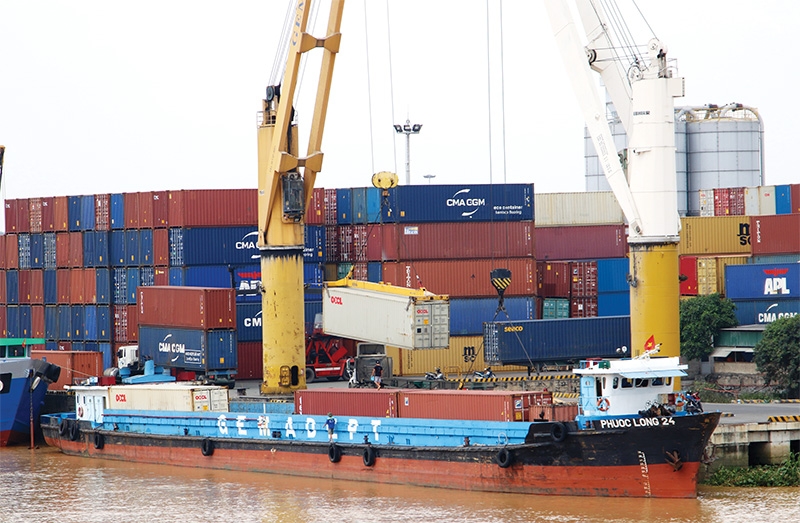Logistics groups strive to exploit EVFTA potential
 |
| Logistics groups in Vietnam will have to up their game to meet EU demands, photo Le Toan |
Tran Viet Huy, managing director of Tracimexco - Supply Chains and Agency Services JSC (TRA-SAS), told VIR that the EU-Vietnam Free Trade Agreement (EVFTA) will open up doors for all players in the logistics market as trading and investment will increase remarkably.
However, more competition will be created for Vietnam’s third-party logistics players to tap into the potential of the EVFTA. In particular, local players will need to transform themselves to meet the sophisticated demands of European counterparts.
To avail the opportunity, TRA-SAS is doubling investment into logistics facilities in some potential segments this year. “The company has recognised that any investment plan should be based on high-skilled workforce, an area which is becoming more and more competitive,” Huy said. “In particular, EU companies are in an advanced position in attracting high-skilled manpower. However, increasing investment is the only way for Vietnamese third-party logistics players to not be left behind.”
Nicolas Audier, chairman of EuroCham, said that Vietnam’s logistics sector and its maritime trade will see significant benefits from the EVFTA. “This historic free trade agreement will boost trade with the EU, but this increased flow of goods cannot happen without supporting industries such as transport networks, supply chains, and logistics infrastructure,” he said. “Nor can it happen without the companies who facilitate these essential commercial activities.”
From the perspective of individual companies, the elimination of tariffs should help to reduce operational costs and fees for enterprises. This capital can then be re-invested into business development and growth.
However, barriers remain. While Vietnam’s import-export and customs procedures have seen significant modernisation in recent times, logistics costs remain high, processes are often manual, and transport networks can be congested and remote from ports and manufacturing centres. “If these issues can be addressed, it would streamline Vietnam’s infrastructure and, in turn, help to increase the flow of trade with the EU,” Audier added.
On top of these structural improvements, he recommended that the government and business communities on both sides continue to share information and know-how through networking opportunities and events.
Last month, EuroCham signed an MoU with Vietnam Maritime Administration. The agreement, and the spirit of partnership it represents, will be one of the most important factors in unlocking the full potential of the EVFTA, according to EuroCham.
After just over a year of implementation, the Comprehensive and Progressive Agreement for Trans-Pacific Partnership (CPTPP) has contributed more than $3.9 billion to Vietnam’s trade surplus. Along with the newly-introduced EVFTA, these are major economic achievements requiring important reform.
Yet, according to the Vietnam Chamber of Commerce and Industry (VCCI), up to 77 per cent of enterprises in Vietnam do not know of, or have only just heard about, the CPTPP and the EVFTA. Clearly, the VCCI said, there is a need for greater understanding of the benefits that FTAs can bring to businesses and trade. Under the terms of the EVFTA, 70 per cent of Vietnamese exports will enter the EU’s member states duty free, while remaining tariff lines will be reduced gradually within seven years.
Russell Reed, managing director of UPS Vietnam and Thailand, noted that business owners should keep up to date on the prevailing tariffs applicable to their business to take advantage of savings and competitive pricing. The agreement also simplifies entry of goods procedures including customs clearance into the EU, but businesses should also be aware of the FTA’s customs requirements such as product origin, food safety and technical standards, and the continued applicability of import and sales VAT.
UPS have launched some initiatives aiming to help Vietnamese-based businesses optimise supply chains and respond more quickly in a continually-evolving trade environment. With more FTAs in the region being negotiated, and an EU-ASEAN FTA potentially on the cards, the most successful companies will be those that seize competitive advantages offered by the deals to unlock new cross-border trade prospects.
However, Jeffrey Tan, group head of Corporate Development and Network & Connectivity at YCH Group, told VIR there are still challenges for foreign logistics firms to expand their business in Vietnam, including lengthy administrative procedures and delays in customs clearance.
The establishment of new companies is also subject to conditions on ownership and services, with services being clearly segmented into 16 types. This will lengthen the paperwork for companies like YCH Group, explained Tan, which primarily focuses on being an integrated end-to-end supply chain and logistics solutions provider.
What the stars mean:
★ Poor ★ ★ Promising ★★★ Good ★★★★ Very good ★★★★★ Exceptional
Themes: EVFTA & EVIPA
Related Contents
Latest News
More News
- SK Innovation-led consortium wins $2.3 billion LNG project in Nghe An (February 25, 2026 | 07:56)
- THACO opens $70 million manufacturing complex in Danang (February 25, 2026 | 07:54)
- Phu Quoc International Airport expansion approved to meet rising demand (February 24, 2026 | 10:00)
- Bac Giang International Logistics Centre faces land clearance barrier (February 24, 2026 | 08:00)
- Bright prospects abound in European investment (February 19, 2026 | 20:27)
- Internal strengths attest to commitment to progress (February 19, 2026 | 20:13)
- Vietnam, New Zealand seek level-up in ties (February 19, 2026 | 18:06)
- Untapped potential in relations with Indonesia (February 19, 2026 | 17:56)
- German strengths match Vietnamese aspirations (February 19, 2026 | 17:40)
- Kim Long Motor and AOJ Suzhou enter strategic partnership (February 16, 2026 | 13:27)

 Tag:
Tag:




















 Mobile Version
Mobile Version